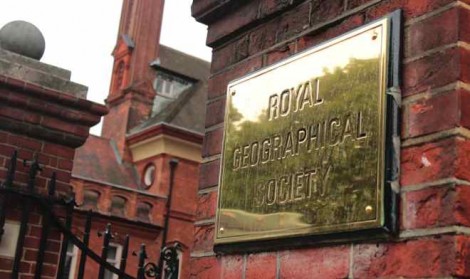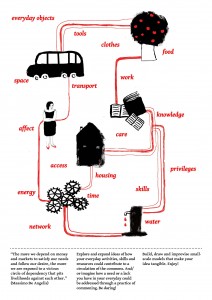26th-29th August 2014
“Co-producing urban contestation across the world: a roundtable with academics and social movement activists” Sara Gonzalez, Stuart Hodkinson and Michael Janoschka
Wednesday 27 August 2014, Session 4 (16.50-18.30)
Confirmed speakers are:
- Andrea Carrasco, lawyer and activist in the Platform for those Affected by Mortgages (PAH – Plataforma Afectados por la Hipoteca) in Getafe (Madrid)
- Matheus Grandi, PhD student in Geography at the Federal University of Rio de Janeiro, Brasil.
- Richard Pithouse, Department of Political and International Studies, Rhodes University
- Debora Swistun, PhD student in Social Anthropology in the Area of Urban Studies of the Research Institute “Gino Germani” Buenos Aires
- Loretta Lees, Professor, Leicester University
- Daniel Mullis, PhD student, Geography Institute, Goethe University Frankfurt
This panel will bring academics and activists together to discuss how knowledge and action are being and can be co-produced in relation to specific aspects of urban contestation including struggles against gentrification and displacement and the privatisation of housing, municipal services and urban space. We will draw from international experiences of recent urban uprisings and struggles in southern Europe and Latin America, anti-austerity campaigns in the UK and more longstanding relationships between urban social movements and academics around the world. Panellists will showcase specific examples and experiences of co-production and collaboration in different cities across the world and critically reflect on a number of key issues including: the co-production of theoretical and practical knowledge, the effectiveness of collaborations, power dynamics and relations, academic and class privilege, the impact of different contexts and histories, and how the neoliberalising Higher Education environment shapes these relationships.
In addition, members of contested cities Leeds are also organising three sessions:
From Co-production to Alternative Futures: Social Movements, Common(s) and ‘Other Values’
Friday 29 August 2014,
Session 2, (11.10-12.50) Session 3 (14.40- 16.20) and Session 4 (16.50-18.30)
(1) Creating cracks: value, commons and alternative economy
(2). Creating commons, creating ‘other value’
(3). Creating social movements, praxis and reflection
We are pleased to announce three exciting sessions thinking through alternative futures at this years RGS-IBG Annual International Conference 2014. During these panels we aim to explore contradictions, tensions and potentialities of co-production of ‘other values’, the common(s) and social change. Each of the three sessions will focus on a different aspects of these engagements. We hope to make space for debates that encompass interdisciplinary and social movement responses and action, in order to engage with and create understandings of ‘alternative futures’ in the here and now.
CFP: From co-production to alternative futures: social movements, common(s) and ‘other values’.
“On one side, a social force called capital pursues endless growth and monetary value. On the other side, other social forces strive to rearrange the web of life on their own terms” (De Angelis, 2007).
This session aims to bring together critical geographers and researchers from affiliated disciplines to explore the contradictions, tensions and potentialities of co-production, in exploring ‘other values’, the common(s) and social change. De Angelis (2007) identifies the way ‘other values’ are created through social movements engaging in resistive practices, the co-production of alternatives, and the way in which they resist, subvert and/or subsist with the capitalist extraction of value from our activity.
Related to the co-production of these ‘other values’ is the defence of existing and collective construction of new heterogeneous forms of common(s). Geographers have been increasingly examining commons and commoning through work ranging from research into ‘actually existing commons’ (Eizenberg, 2011), such as the ‘urban commons’ (Jeffrey et al. 2012; Chatterton, 2010; Hodkinson, 2012; Chatterton et al, 2013) to more abstract theoretical and conceptual engagements (Hardt & Negri, 2009; Jeffrey et al, 2011). However, whilst many of these debates highlight the potentiality of the common(s) as part of wide-ranging social change, as George Caffentzis has examined, commons are not inherently anti-capitalist, and are being increasingly utilized as part of a strategy of austerity led ‘neoliberalism plan b’ (2010).
Session Organisers: Victoria Habermehl and André Pusey
Session 1. Creating cracks: value, commons and alternative economy
Paper 1. Community currencies of the recession era: Collective co-production of a post-capitalist future? Phedeas Stephanides (University of East Anglia)
Paper 2. Value as Voice: Prefiguring Post-Capitalist Production Against the Global Division of Labour. Sofa Gradin (Queen Mary, University of London)
Paper 3. Mobile commons’ within and against temporary work. Gabriella Alberti (University of Leeds)
Paper 4. Other Values: Considering digital currency as a commons. Rachel O’Dwyer (Trinity College Dublin)
Paper 5. The political potential of Time Banking. Gradon Diprose (Victoria University of Wellington / Open Polytechnic, New Zealand)
Session 2. Creating commons, creating ‘other value’
Paper 1: Dublin’s independent spaces: politics and practices of everyday commoning. Michael O’Broin and Patrick Bresnihan (Trinity College Dublin)
Paper 2: An Emancipatory Project for Higher Education – The Social Science Centre, Lincoln. Social Science Centre members (Social Science Centre)
Paper 3: Beyond Public and Private: the Transformation of Higher Education. Pete Somerville and Gary Saunders (University of Lincoln)
Paper 4. From Crisis to Commoning: An Examination of Socio-Spatial Relations in Cooperative Mobile Home Communities. Elsa Noterman.(University of Wisconsin-Madison, USA)
Paper 5. New Cross Commoners: productive tensions. Lawrence Dodd, Bianca Elzenbaumer and Alice McHugh (Independent)
Session 3. Creating social movements, praxis and reflection
Paper 1: Alternative urban futures through co-production: Social movements and grassroots creativity in Southern Europe during the crisis. Lila Leontidou (Hellenic Open University, Greece)
Paper 2. Collective cultural co-production to pursue alternative urban futures. The case of Macao in Milan. Chiara Valli (Uppsala University, Sweden)
Paper 3. The Logic of Homogeneity in Radical Social Movements. Nazima Kadir (Independent)
Paper 4. Towards a production of knowledge from the movements for the movements: the experience of ‘Grupo Popular Pesquisa em Ação‘ in Rio de Janeiro. Grupo Popular Pesquisa em Ação members (Grupo Popular Pesquisa em Ação, Brazil)
Paper 5. Commoning & Consensus Building – Shifting Subjectivities and the re-configuration of the self in radical activist praxis. Sophie Wynne-Jones (Aberystwyth University) Kelvin Mason (Independent)
Friday 29 August 2014,
Session 2, (11.10-12.50) Session 3 (14.40- 16.20) and Session 4 (16.50-18.30)
http://research.ncl.ac.uk/geographiesofjustice/



 Creative Commons 2024 Contested Cities. Algunos derechos reservados. Todo el sitio, si no se especifica lo contrario, licenciado bajo
Creative Commons 2024 Contested Cities. Algunos derechos reservados. Todo el sitio, si no se especifica lo contrario, licenciado bajo